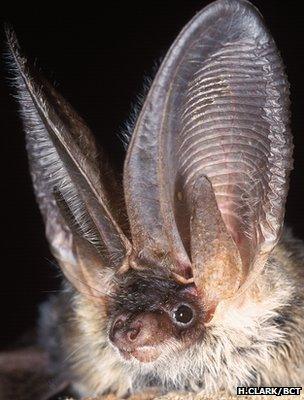Website calls on people to become 'bat detectives'
- Published

Many bat species migrate, making a pan-European identification tool necessary
A website is calling on citizen scientists to help researchers monitor and record Europe's bat population.
The Bat Detective website, external needs people to help identify bat calls to help develop automated identification tools.
The site converts normally inaudible bat calls into something humans can hear and provides information needed to help visitors identify species.
Scientists say understanding bat populations provides an important indicator of ecosystem health.
"Bats use a lot of different types of sounds, from singing to each other to find a mate and to using echoes from their tweets to find their way around, " explained Kate Jones, joint University College of London (UCL) and Zoological Society of London (ZSL) chairwoman of ecology and biology.
"Usually, bat sounds are inaudible to humans as they are too high for us to hear but special 'time expansion' ultrasonic detectors convert these sounds to a lower frequency," Prof Jones, who is also chairwoman of the UK Bat Conservation Trust, explained.
"Visitors to the Bat Detective website can listen to these unique recordings and help us distinguish different sounds."
Lend an ear
Conservationists say one-in-four species are threatened with extinction, adding that better automated identification devices were "desperately needed".
"We hope hundreds of thousands of people will help us listen in to what the bats are saying and to also build important tools for conservation," said Dr Chris Lintott from the University of Oxford, who led the team that designed and built the website.
In a recent paper in the Journal of Applied Ecology, external, researchers published details about a freely available online tool used identify the calls of bat species found in Europe, helping to improve knowledge of the mammals.
The raw data, collected by volunteers across Europe, allowed them to develop the identification tool, iBatsID, external, which has been used identify 34 out of continent's 45 known species.
It is this raw data that visitors to the website will be able to access and help the Bat Detective team identify.
The team hope to expand the sounds available on the website, so people will be able to hear calls from species around the world.
- Published7 August 2012
- Published1 October 2011